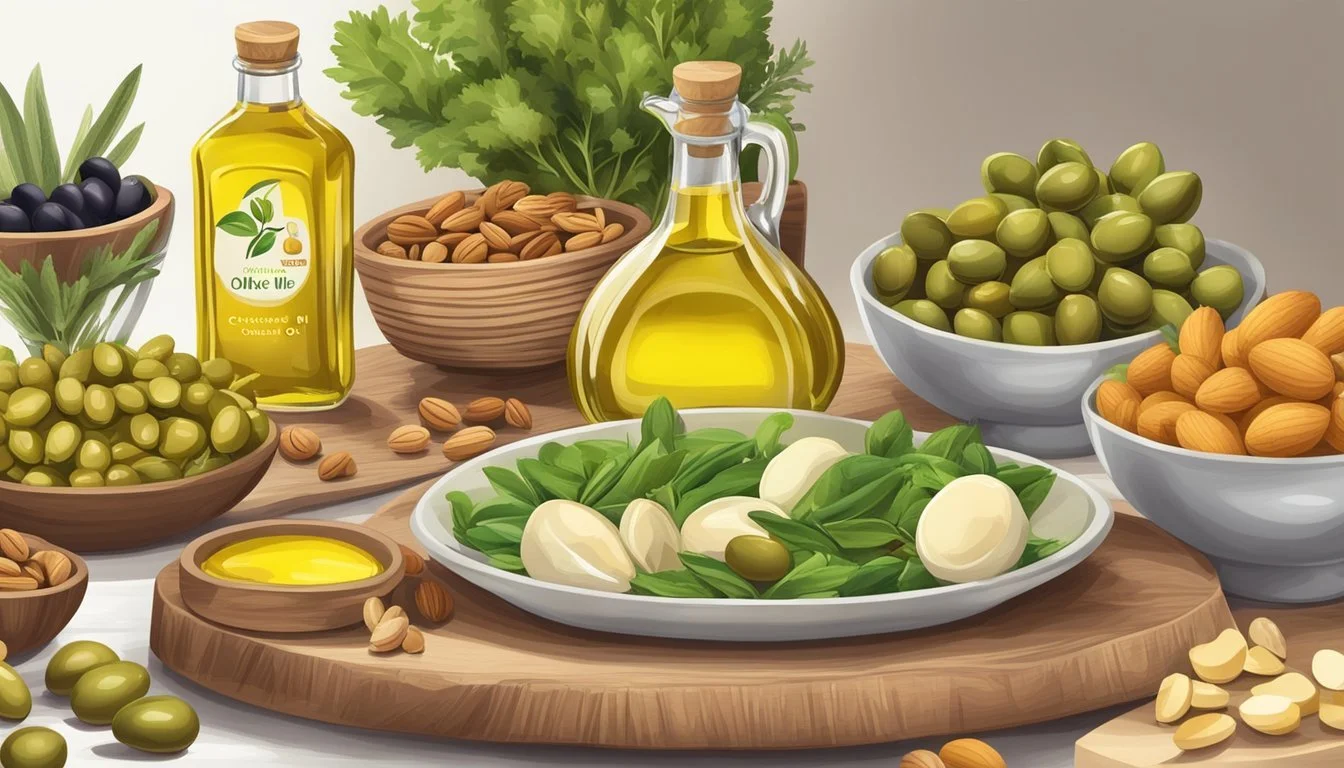Keto Diet: Canola Oil vs Olive Oil – Which Is the Healthier Choice?
When adopting a keto diet, the types of fats consumed are as crucial as the low carbohydrate intake that characterizes this dietary plan. Fats become the primary energy source, replacing carbohydrates, and thus the choice of cooking oil directly affects the diet's nutritional benefits and success. The keto diet emphasizes high-fat intake, moderate protein, and minimal carbohydrate consumption to encourage the body to enter a state of ketosis, where it burns fat for energy instead of glucose.
In the pantheon of fats, both canola oil and olive oil have generated considerable discussion regarding their appropriateness for a keto diet. Canola oil, derived from the rapeseed plant, offers a notable zero-carb content and is rich in monounsaturated fats. It also contains essential omega-3 and omega-6 fatty acids, which are important for heart health. On the other hand, olive oil, extracted from pressed olives, (What wine goes well with olives?) stands out for its high monounsaturated fat content. Extra virgin olive oil, in particular, is celebrated for its health benefits, including its antioxidant properties and its ability to maintain stability when heated.
An informed choice between canola oil and olive oil requires an understanding of their unique nutritional profiles and how they align with the goals of the keto diet. Considering the body's need for healthy fats for fuel, culinary versatility, and the long-term implications for heart health, the oils one chooses can impact the overall effectiveness and enjoyment of the keto lifestyle. Careful selection based on sound knowledge of their properties can greatly enhance the keto dieter’s experience.
Understanding Fats in the Keto Diet
In the context of a ketogenic diet, the types of fats consumed are pivotal in maintaining ketosis and overall health. Emphasizing the right balance can contribute to sustained energy levels and heart health.
Saturated vs Unsaturated Fats
The debate between saturated and unsaturated fats plays a significant role in dietary choices. Saturated fats are solid at room temperature and often found in animal products and tropical oils. They are traditionally considered less heart-healthy due to their potential to raise LDL cholesterol levels. On the other hand, unsaturated fats, which include monounsaturated fats (MUFAs) and polyunsaturated fats (PUFAs), tend to be liquid at room temperature and come from plant sources. They are generally deemed heart-healthy, being beneficial for cholesterol levels and overall cardiovascular health.
Monounsaturated fats: olive oil, avocado (how long does avocado last?) oil, canola oil
Polyunsaturated fats: include omega-3s and omega-6s, found in fish, nuts, and certain vegetable oils
Unsaturated fats are crucial on a ketogenic diet as they provide a clean energy source and support cellular health.
Importance of Fat Quality
The quality of fat in the ketogenic diet is vital due to its impact on long-term health. Fats with a high smoke point, such as avocado oil, are preferred for cooking as they are less likely to oxidize and degrade, which can lead to the creation of harmful free radicals.
A table outlining the fat composition and smoke points of canola and olive oils:
Oil Type Monounsaturated Fat Polyunsaturated Fat Saturated Fat Smoke Point Canola High (approx. 60-65%) Moderate (15-20% omega-6, 10% omega-3) Low High Olive High Low Moderate Moderate to High
High-quality fats are associated with reducing inflammation and providing sustained energy, making them ideal for a high-fat ketogenic diet.
Defining the Ketogenic Diet
The ketogenic diet is a high-fat, moderate-protein, and low-carbohydrate diet. It hinges on the body utilizing fat for energy rather than carbohydrates, thus requiring:
65-75% of daily calories from fat
15-30% of calories from protein
5-10% of calories from carbohydrates
The goal of the ketogenic diet is to enter a state of ketosis where the body produces ketones for energy instead of relying on carbs. The right balance of dietary fats, including both saturated and unsaturated, is essential to sustain this metabolic state and to reap the health benefits of the diet.
Canola Oil in a Ketogenic Diet
Canola oil is often considered a versatile and keto-friendly option for those following a ketogenic diet due to its low carb content and favorable fatty acid composition.
Extraction and Processing
Canola oil is derived from the seeds of the canola plant, a genetically modified version of the rapeseed plant with lower levels of erucic acid. The oil is typically extracted using a mechanical process followed by a refining process to remove impurities. The refining process includes the steps of degumming, neutralizing, bleaching, and deodorizing, which effectively removes free radicals and reduces the presence of compounds that can cause inflammation.
Nutritional Profile
Canola oil is known for its high monounsaturated fat content and is a good source of omega-3 and omega-6 fatty acids. These fats are associated with potential heart health benefits. They can support a ketogenic diet where fat intake is significantly higher than other macronutrients.
Nutritional Breakdown per 1 tablespoon of canola oil:
Calories: 124
Total Fat: 14 grams
Saturated Fat: 1 gram
Monounsaturated Fat: 9 grams
Polyunsaturated Fat: 4 grams
Omega-3 Fatty Acids: 1279 milligrams
Omega-6 Fatty Acids: 2610 milligrams
Canola Oil in Cooking
Canola oil is well-suited for various cooking methods due to its relatively high smoke point of around 400°F (204°C), which is beneficial for frying and baking. It has a mild flavor that doesn't overpower dishes, and its texture is ideal for a range of culinary applications. When using canola oil in a ketogenic diet, its use in cooking can contribute to the necessary daily fat intake without adding carbohydrates, aligning well with the ketogenic nutritional approach.
Olive Oil in a Ketogenic Diet
Olive oil, particularly extra virgin olive oil, is heralded for its nutritional benefits and versatility in cooking, making it a favorable choice for those following a ketogenic diet, where healthy fats are crucial.
Varieties and Extraction
Extra virgin olive oil (EVOO) is the highest quality olive oil, obtained through mechanical methods without the use of heat or chemicals, which ensures maximum preservation of flavor and nutrients. Virgin olive oil is also mechanically extracted, but has a slightly higher acidity level. The different varieties of olive oil include:
Extra Virgin Olive Oil: Less than 0.8% acidity, no refined oil content
Virgin Olive Oil: Less than 2% acidity, little to no refined oil content
Nutritional Benefits
Olive oil is rich in monounsaturated fats, mainly oleic acid, which may contribute to heart health by maintaining healthy cholesterol levels. It also contains polyphenols, which are antioxidants with anti-inflammatory properties. These components make olive oil a heart-healthy option:
Monounsaturated fats: Help with the maintenance of good cholesterol levels
Polyphenols: Provide anti-inflammatory effects and promote heart health
Using Olive Oil in Cooking
The diverse applications of olive oil in a ketogenic diet range from frying to drizzling over salads. However, it is important to consider the smoke point—the temperature at which oil begins to break down and produce smoke—when choosing which type to use for various cooking methods.
Frying and Baking: High-quality EVOO has a smoke point around 375-400°F (190-204°C), suitable for most oven-baking and medium-heat frying.
Drizzling and Salad Dressings: Extra virgin and virgin olive oils are excellent for drizzling over dishes or mixing into salad dressings due to their robust flavors and health benefits.
Comparing Smoke Points
When selecting oils for a keto diet, understanding the smoke points is crucial for maintaining the quality and nutritional value of the fats. Different oils react to heat distinctly, which is pivotal when considering their use in various cooking methods.
Smoke Point Significance
The smoke point of an oil is the temperature at which it begins to smoke and break down. Oils with higher smoke points are more stable and can be heated to higher temperatures without oxidizing, which is important for preserving their health benefits. On the other hand, oils with lower smoke points are more sensitive to heat and are best reserved for low-temperature cooking or as a finishing oil, like in salad dressings.
Impact on Keto Cooking
Canola oil has a higher smoke point, typically around 400°F (204°C), making it suitable for high-temperature cooking methods, such as frying or baking. Olive oil, particularly extra virgin olive oil, has a lower smoke point, generally around 320°F to 375°F (160°C to 190°C), which leans toward light sautéing, low-heat baking, and use in salad dressings. For ketogenic diets, high smoke point oils like avocado oil and coconut oil, both known for their higher smoke points at around 520°F (271°C) and 350°F (177°C) respectively, are also popular choices, as they provide the needed fats and are versatile for various cooking applications without compromising their integrity and keto-friendly benefits.
Health Implications
When comparing canola oil to olive oil within a ketogenic diet framework, it is imperative to examine the impact these oils have on heart health, inflammatory response, and their effects on maintaining ketosis.
Heart Health and Cholesterol
Canola oil is high in monounsaturated fats and contains a balance of omega-3 and omega-6 fatty acids, which can be beneficial for heart health. It generally has a lower percentage of saturated fats, which may help to manage cholesterol levels—a critical factor in reducing the risk of cardiovascular disease and stroke. Conversely, extra virgin olive oil is lauded for its heart-healthy benefits. Rich in monounsaturated fats and low in saturated fat, extra virgin olive oil is linked to improved cholesterol profiles and reduced risk of heart disease.
Inflammation and Omega Fats
A key consideration in a ketogenic diet is the ratio of omega-3 to omega-6 fatty acids. Olive oil is composed predominantly of oleic acid, which has anti-inflammatory properties. It also contains lower levels of omega-6 fatty acids, which are known to promote inflammation when consumed in excess. Canola oil, on the other hand, contains both omega-3 and omega-6 fats but in significantly higher amounts of omega-6, which might lead to an imbalance and promote inflammation, potentially affecting individuals with type 2 diabetes or those at risk of chronic diseases linked to inflammatory processes.
Effects on Ketosis
Maintaining a state of sustained ketosis is the cornerstone of a ketogenic diet. Both canola and olive oils are considered keto-friendly due to their high fat content and low carbohydrate profile. However, the type of fat is important: olive oil, with its high concentration of monounsaturated fats, could be more beneficial in sustaining ketosis with added health benefits. The fat profile of canola oil may not be as conducive to the anti-inflammatory needs of a ketogenic diet, though it is still an acceptable oil to use in moderation on keto.
Culinary Uses and Flavor Profiles
When selecting oils for the keto diet, the focus is on taste considerations and best uses in meals to complement the high-fat, low-carb approach. The following subsections detail specific culinary applications and flavor profiles for canola oil and olive oil.
Taste Considerations in Keto Recipes
Canola Oil: It has a neutral taste, making it a versatile ingredient that doesn't overpower other flavors in keto recipes. Canola oil is known for its subtlety, allowing the primary ingredients of a dish to stand out.
Olive Oil: Renowned for its prominent flavor, olive oil can impart fruity or peppery notes to dishes. Its distinct taste is a significant factor in keto cooking, as it can elevate the sensory profile of low-carb meals.
Frying & Baking: Neutral oils like canola are preferred in keto recipes for frying and baking due to their high smoke points and flavorless nature.
Salad Dressings & Drizzling: Olive oil is a staple for creating flavorful dressings and for drizzling over dishes to add a depth of taste.
Best Uses in Meals
Canola Oil: Given its moderate to high smoke point, canola oil is well-suited for high-heat cooking methods.
Cooking Techniques: Excellent for frying and sautéing as it does not introduce competing flavors.
Baking: Its neutral taste won't alter the desired flavor profile of baked keto goods.
Olive Oil:
Salad Dressings: The rich taste of olive oil enhances the flavor of keto-friendly salads.
Low-Heat Cooking: Ideal for light sautéing and gentle roasting, where its taste can shine.
Drizzling: Perfect as a finishing touch on a dish to provide a burst of flavor.
Alternatives to Canola and Olive Oil
While canola and olive oil are common in keto cooking, several other oils and fats offer health benefits and versatility for a ketogenic diet.
Other Keto-Friendly Oils and Fats
Coconut Oil: Rich in saturated fats, coconut oil is a stable fat for cooking and a popular choice for keto due to its high medium-chain triglycerides (MCTs) content, which can aid in ketone production.
Avocado Oil: High in monounsaturated fats and low in polyunsaturated fats, avocado oil has a high smoke point, making it suitable for high-heat cooking.
MCT Oil: A concentrated source of medium-chain triglycerides, MCT oil is a derivative of coconut oil and is easily converted into ketones by the body.
Animal Fats: Options like lard, tallow, duck fat, and ghee are high in saturated fats, providing flavor and a high smoke point for cooking.
Ghee: Clarified butter with the milk solids removed, ghee is a lactose-free fat rich in saturated fatty acids and ideal for high-temperature cooking.
Non-Oil Keto Fat Options
Fat Bombs: Small snacks made of healthy fats like coconut oil or ghee, often combined with seeds or nuts, which provide a quick source of energy.
Dairy Products: Full-fat cheese and cream are excellent sources of saturated fat and provide calcium and protein.
Eggs: Eggs are a keto staple that provides high-quality fats and proteins, with yolks being rich in healthy fats.
Nuts and Seeds: Almonds, macadamias, and chia seeds are good sources of fats and can be included in moderation due to their high caloric density.
Avocados: Avocados are high in monounsaturated fats and fiber, making them a nutrient-dense, filling option for those on a keto diet.
Expert Insights
When comparing Canola Oil and Olive Oil within a ketogenic diet, it's vital to consider expert opinions, particularly from registered dietitians, on the health implications and suitability for keto.
Registered Dietitian Recommendations
Registered dietitians often recommend Extra Virgin Olive Oil as a top choice for heart health due to its high content of healthy monounsaturated fats. These fats can improve cholesterol levels and have been shown to provide cardiovascular benefits.
On the other hand, Canola Oil, while keto-friendly due to its zero-carb content, contains both omega-3 and omega-6 fatty acids. A registered dietitian might suggest moderate consumption because despite the presence of heart-healthy monounsaturated fats and anti-inflammatory omega-3s, Canola Oil also contains omega-6 fatty acids, which can be pro-inflammatory when consumed in large amounts.
In terms of usage, a dietitian would emphasize that Extra Virgin Olive Oil is best used for cold dishes or low to medium heat cooking, preserving its beneficial properties. For higher heat applications, refined Olive Oil or Canola Oil can be more suitable choices, as they have higher smoke points and are more stable at high temperatures.
Dietitians studying ketogenic dietary patterns prioritize oils that support overall health goals. This includes incorporating oils like Olive Oil that are not just keto-compliant but also contribute positively to long-term health metrics, particularly heart health.
Conclusion
When evaluating oils for the ketogenic diet, it's crucial to prioritize health-promoting fats, particularly those rich in monounsaturated fats. Olive oil shines in this respect, boasting high levels of these beneficial fats.
In contrast, canola oil displays a more complex profile. Although it’s low in carbohydrates and high in fat, fitting the keto framework, its highly refined nature and the potential for containing trans fats tilt the balance unfavorably when considering the overall health impact.
The ketogenic lifestyle emphasizes oils that support good health. Here, olive oil stands out as a superior choice due to its unrefined nature and the abundance of healthy monounsaturated fats. Additionally, its versatility in cooking and salad dressings makes it an excellent ally for those on a keto diet.
Considerations for Keto Oils Canola Oil Olive Oil Carb Content Low/Zero Low/Zero Fat Type Varied, Potential Trans Fats High Monounsaturated Fats Processing Highly Refined Minimal/Unrefined Suitability for Keto Conditional Favored
One should remain mindful of the quality and processing of the oils they choose. Ultimately, olive oil is the preferred option for individuals adhering to a ketogenic diet seeking an oil that is not only keto-appropriate but also beneficial for their health in the long term.






